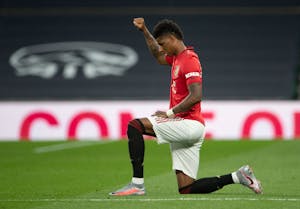 The year 2020 is destined to go down in history for all the wrong reasons. The world seems more divided than ever; a global pandemic has put a halt on just about everything and people are wondering if things will ever return to normal.
The year 2020 is destined to go down in history for all the wrong reasons. The world seems more divided than ever; a global pandemic has put a halt on just about everything and people are wondering if things will ever return to normal.
But one piece of history made last week will be looked upon kindly. For first time, the number 10 leading the way on UK policy was not the one based on Downing Street, but the one usually found terrorising defences on the pitch at Old Trafford.
Marcus Rashford launched his #maketheUturn campaign on June 15 on the issue of providing food vouchers for the nation’s most vulnerable children, and two days later, the government did just that.
A 22-year-old Premier League footballer has almost single-handedly driven a campaign that will now save over 1.3 million children from going hungry.
It is one of many recent examples of the voice of the athlete becoming more and more impactful. Yet many still protest that sportspeople should “stick to sport”. So, what are the implications of this dramatic shift, for brands, rights-holders and athletes alike?
This shift is clearly a global one. Over recent weeks and months, we have seen American athletes have a louder and more impactful voice about police brutality than their own politicians; while athletes in the UK, such as Aston Villa’s Tyrone Mings, have attended BLM marches to fight against racial injustice.
It is movements across the globe such as these that have led to the charge against the police officer involved in George Floyd’s death to be elevated to second degree murder. Athletes have shown that by speaking out you can affect change, and if you have a large platform to do so, why would you not?
The next generation of athletes clearly feels a responsibility to push through adversity towards positive societal change. The natural groundswell of support for Rashford last week, and the speed in which it all happened, shows that these athletes are tuned in to what real people are actually feeling and experiencing on a day-to-day level, more than any government official.
It’s notable that Rashford himself had first-hand experience of being on food stamps, just as all the athletes in the US had experienced racism themselves. It is that combination of huge reach alongside (in some cases) a genuine first-hand understanding of the plight real people are going through, that makes the voice of the athlete so impactful when compared to many politicians.

What was most noticeable about Rashford’s campaign was that at no point did he criticise or attack any political party or figure. His open letter was impassioned and impactful, but never aggressive. And it was that, combined with the huge swathe of support, that gave Mr Johnson no choice but to listen. It was a welcome relief from the more aggressive tone of most political discourse. Rashford has created a blueprint for athletes to use in the future.
The likes of Marcus Rashford and Manchester City’s Raheem Sterling are by no means doing this for notoriety or their own individual gain. However, there is no doubt that this will grow their personal brands make them more marketable as players.
Colin Kaepernick may have been ostracised from the NFL, but he remains a popular figure for brands. Consumers are increasingly looking for corporations to act responsibly and reflect their personal views, so as brands become braver and find their own voices in the fight for what they believe in, they will naturally seek ambassadors who do the same.
It no doubt played a part in Raheem Sterling following in the footsteps of Roger Federer and Thierry Henry to become the latest Gillette ambassador, a brand whose work with Football Beyond Borders strives to help communities become more tolerant and create more role models for the young people of today.
It is important, however, that sportspeople don’t become activists for the sake of a brand deal or to better their image. The public will see right through this. Athletes must carefully cultivate their view of the world, be aware of the risks and be in tune with their audience. They have to believe what they say and talk about it with ease, or else it’s futile. Their purpose must be at the heart of everything.
Sterling is a great example of this. Over the past 12 months, our research shows that 14 per cent of media mentions of the player included links to diversity, racism or inequality. It is a quite staggering figure when you consider the focus on him as a footballer and the success Man City have achieved during the previous 12 months.
There is no doubt that the likes of Sterling, Sadio Mané and Juan Mata have actively focused on living up to their purpose, with the result being that they are rightly seen as leaders of the new wave of athletes with a cause.
This generation of outspoken stars are obviously not the first, and many have fought battles before them.
The late, great Muhammad Ali, for example, was ahead of his time. As an activist and philanthropist he was never afraid to speak his mind, even if was to the detriment of his own career. But despite being widely regarded as the greatest athlete on the planet, even he struggled to influence and affect change in the same manner as Marcus Rashford. He shifted opinions, created movements and inspired a generation, but the shift of power that has allowed a 22-year-old footballer to force a government into a change of policy illustrates just how far we’ve come, and the influence a modern-day athlete has.
Ali, instead of determining policy shift, was stripped of his belt and boxing license – and did not fight for three years. Tommie Smith and John Carlos were expelled from the Olympic Games for their Black Power stance.
Athletes have always stood up, but all too often were made to sit down again. Society has changed. And with that, athletes should feel empowered. The world is still far from perfect, but never have athletes had a better opportunity to strive to make it just that. We as brands, as marketeers and, most importantly, as people have no right to stop them in that quest. Instead we should do everything in our power to support it.